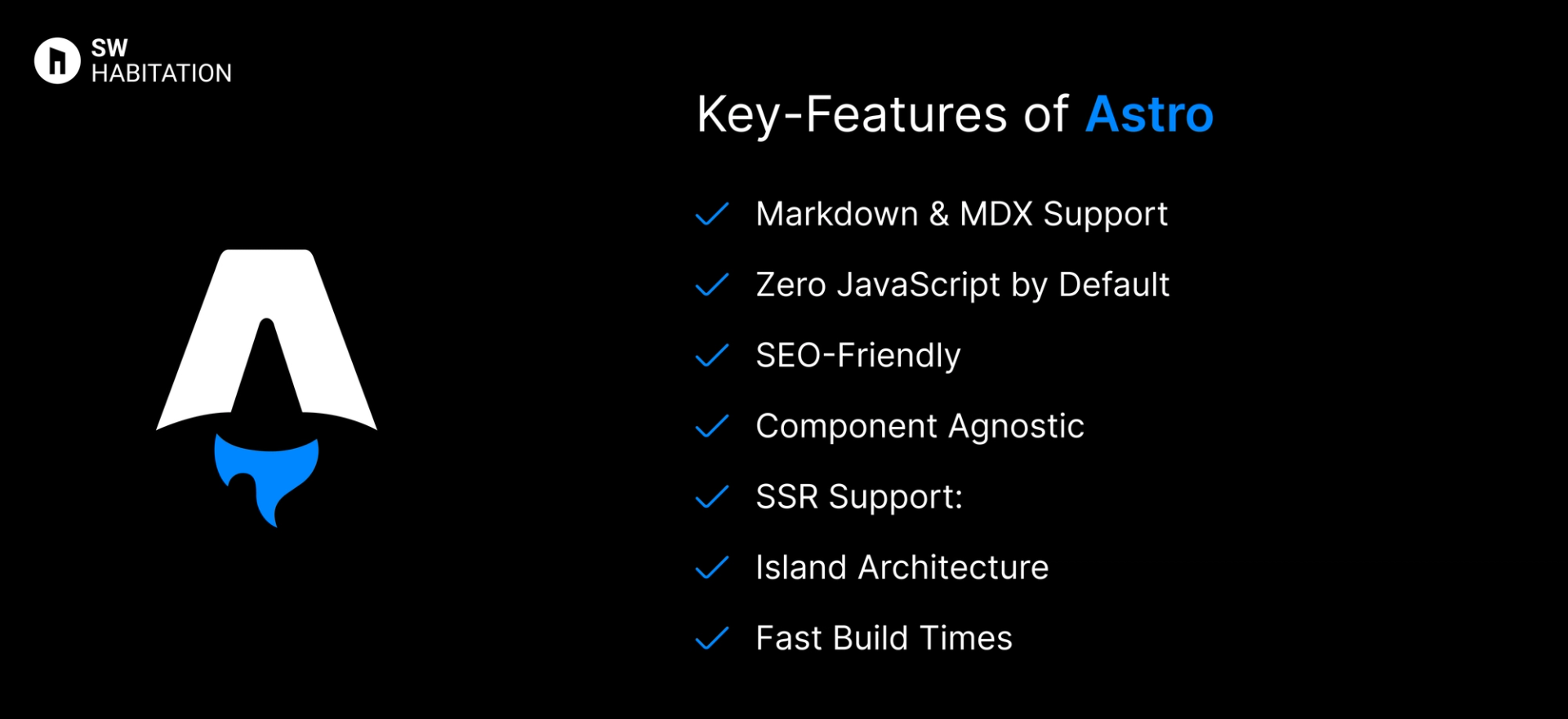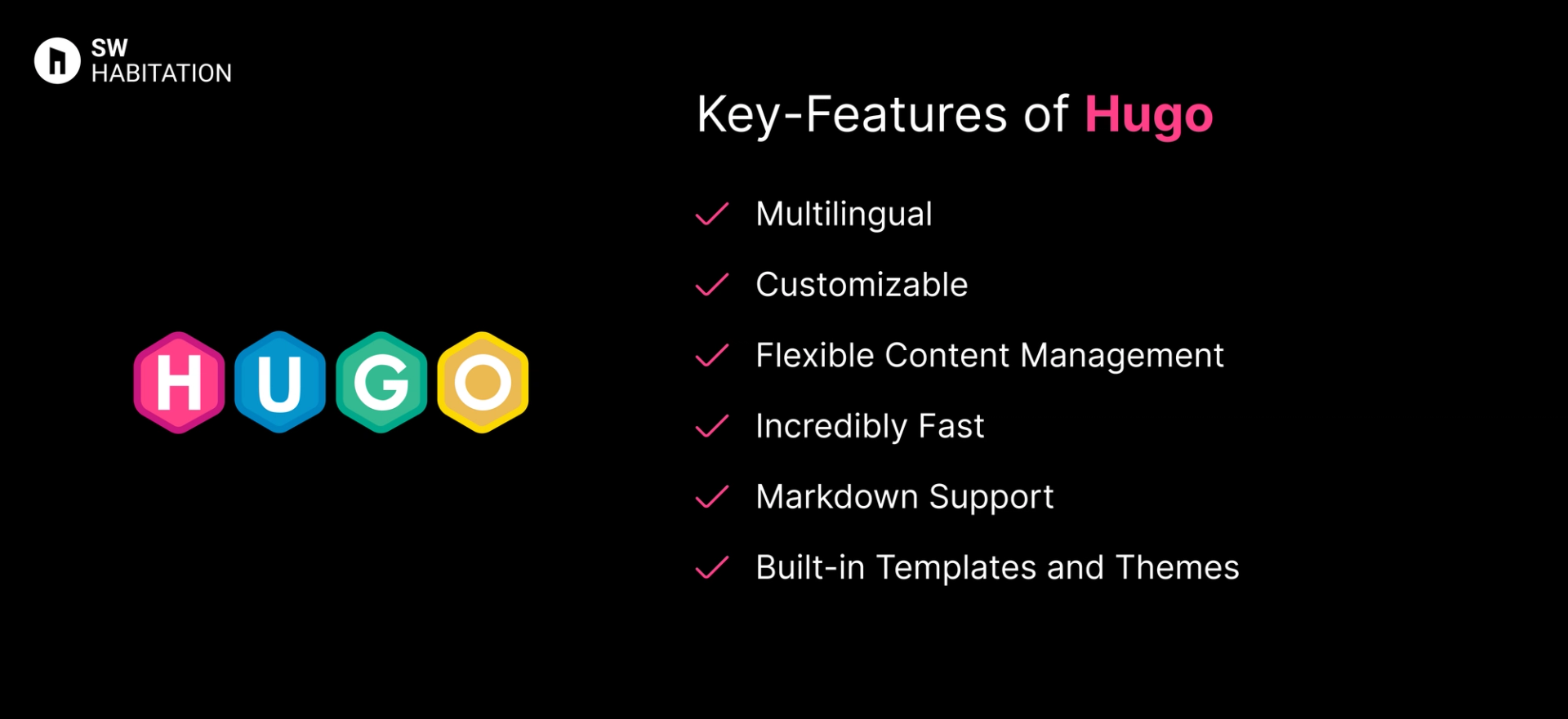Astro vs. Hugo

Astro

Hugo
Have you ever been to a website that loads super fast? Chances are it uses an SSG (Static Site Generator). It’s a tool that builds your site ahead of time, so when someone visits, they get the page instantly. No waiting around for things to load it’s just there.
What is Astro?
Astro is a modern Static Site Generator that focuses on delivering faster websites by sending as little javaScript as possible.
Unlike traditional javaScript frameworks, Astro renders pages at build time, creating static HTML that gets served directly to users.
One of its standout features is the island architecture, which lets you selectively hydrate only the parts of the page that need interactivity means you only load javaScript when it’s absolutely necessary.
Key Features of Astro


- Markdown & MDX Support: Write content with ease using Markdown or MDX.
- Zero JavaScript by Default: No javaScript is sends to the client unless absolutely needed.
- SEO-Friendly: Built-in optimisations like automatic sitemap generation.
- Component Agnostic: Supports React, Vue, Svelte, and more — all in the same project!
- SSR Support: Optional server-side rendering if needed.
- Island Architecture: Load JavaScript only for interactive components.
- Fast Build Times: Optimised for super-fast builds, even for large websites.
Advantages of Astro
- Great for Content-Driven Sites: Perfect for blogs, documentation, and portfolios.
- Developer-Friendly: Clean syntax and great tooling make development a breeze.
- Minimal Setup: Simple config with automatic optimisations.
- Flexible and Versatile: Use multiple frameworks in one project.
- Blazing Fast Performance: Less javaScript means faster load times.
Disadvantages of Astro
- Limited Dynamic Content: Out of the box, it’s more static-focused. Dynamic content needs extra handling.
- Newer Ecosystem: Fewer plugins and community resources compared to older SSGs.
- Learning Curve: Island architecture might take some time to get used to.
What is Hugo?
Hugo is an open-source static site generator written in Go. It’s famous for its speed, being one of the fastest generators available, even with large websites.
Hugo uses Markdown files for content and allows you to customize your site with themes and templates. It’s simple, powerful, and perfect for those who want quick deployment with minimal setup.
Key Features of Hugo


- Multilingual: Easy setup for multi-language websites.
- Customizable: Plenty of configuration options to meet your needs.
- Flexible Content Management: Supports pages, posts, and taxonomies like tags and categories.
- Incredibly Fast: Hugo can generate thousands of pages in just a second.
- Markdown Support: Write in Markdown and Hugo will handle the rest.
- Built-in Templates and Themes: Use or create custom themes for fast and efficient development.
Advantages of Hugo
- Huge Community: With tons of themes, plugins, and community resources.
- Lightweight: Minimal dependencies required, which means less complexity.
- Full Flexibility: Create custom templates or use pre-built themes.
- Multilingual Sites: It’s a breeze to create websites in multiple languages.
- Super Speed: Hugo is one of the fastest static site generators available.
Disadvantages of Hugo
- Limited Plugins: While it has a good set, Hugo’s plugin ecosystem is not as huge as others like Gatsby.
- Requires Go Installation: You’ll need Go installed on your system, which could be a barrier for some users.
- Learning Curve for New Users: It can be challenging for beginners who aren’t familiar with the command line.
Comparison Between Astro vs Hugo
Use Cases of Astro
- SEO-Focused Projects: Ships with built-in SEO optimisations.
- Content-Heavy Sites: Blogs, marketing sites, and documentation hubs.
- Multi-Framework Projects: Mix and match React, Vue, and Svelte in one codebase.
- Developers Seeking Speed: Fast build times and minimal runtime JavaScript.
Use Cases of Hugo
- Fast Build Times: If you have a lot of pages, Hugo generates them at an incredibly fast rate.
- Static Websites: Ideal for creating portfolios, documentation, and landing pages.
- High-Performance Blogs: Perfect for personal and developer blogs with a lot of content.
- Multi-Language Websites: Easy to create and maintain multilingual sites.
Conclusion
Static Site Generators are a big game changer if you’re looking to build a website that’s fast, secure, and easy to maintain. Whether you’re launching a personal blog, portfolio, or a business website, they give you the freedom to focus on what really matters, your content and your users without all the extra complexity.
The best part? You’re not locked into one way of doing things. You can choose the tools and tech you’re most comfortable with, and scale things up as your site grows. From lightning-fast load times to better SEO and easy hosting, SSGs make the whole process smoother.
At the end of the day, it comes down to what fits your workflow and goals best. Pick the one that feels right to your requirements, and you’ll be well on your way to creating a beautiful, high-performing website that you’re proud of 🙌
Frequently asked questions
Is Astro great for blogs and docs?
With support for Markdown and MDX, Astro is a fantastic choice for documentation sites, blogs, and other content-heavy websites
Does Astro support SSR?
Yes, You can use Server-Side Rendering (SSR) for dynamic content, or stick to static generation for blazing fast websites. Astro provides flexibility to choose the best approach.
Can I use React or Vue with Astro?
Yes, Astro supports React, Vue, Svelte, and many other frontend frameworks. You can even mix and match them on the same page.
Why is Astro so fast?
Astro uses HTML-first rendering, so it ships static HTML by default and only hydrates interactive components when necessary, leading to blazing fast performance.
Is Hugo good for large websites?
Hugo is particularly well-suited for large-scale websites with many pages, such as documentation sites, portfolios, and blogs.
Can I customize Hugo themes?
Yes, Hugo comes with a large selection of themes, and they are highly customizable. You can modify them or create your own theme from scratch.
Does Hugo support multiple content types?
Yes, Hugo is highly flexible and supports multiple content types, including Markdown, JSON, YAML, and HTML, making it suitable for all kinds of content-driven websites.
What makes Hugo so fast?
Hugo is incredibly fast because it’s written in Go, a highly performant programming language. It can build websites in seconds, even if they have thousands of pages.
